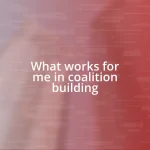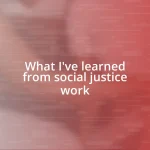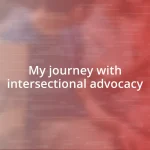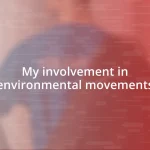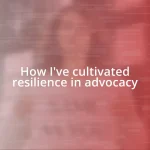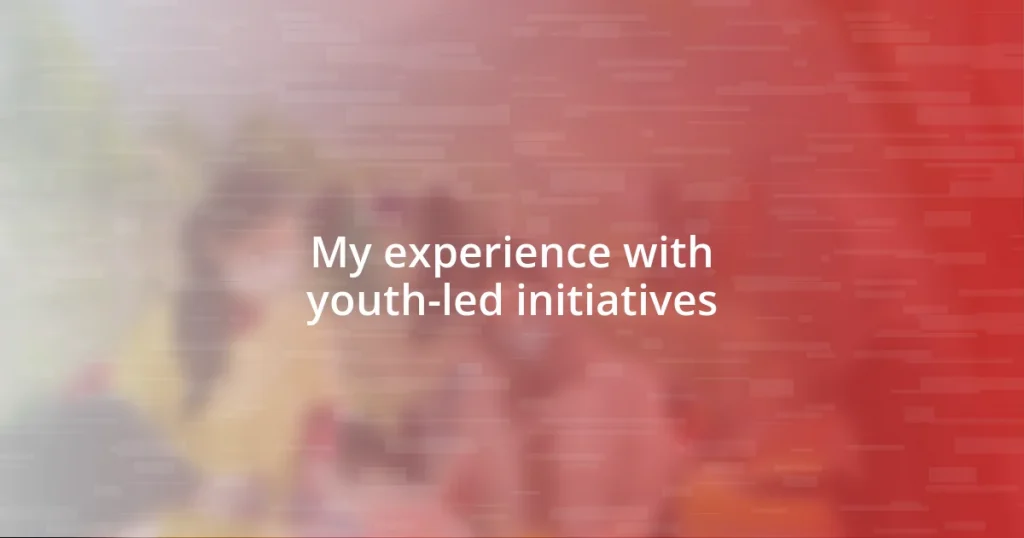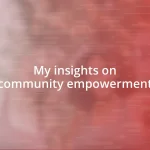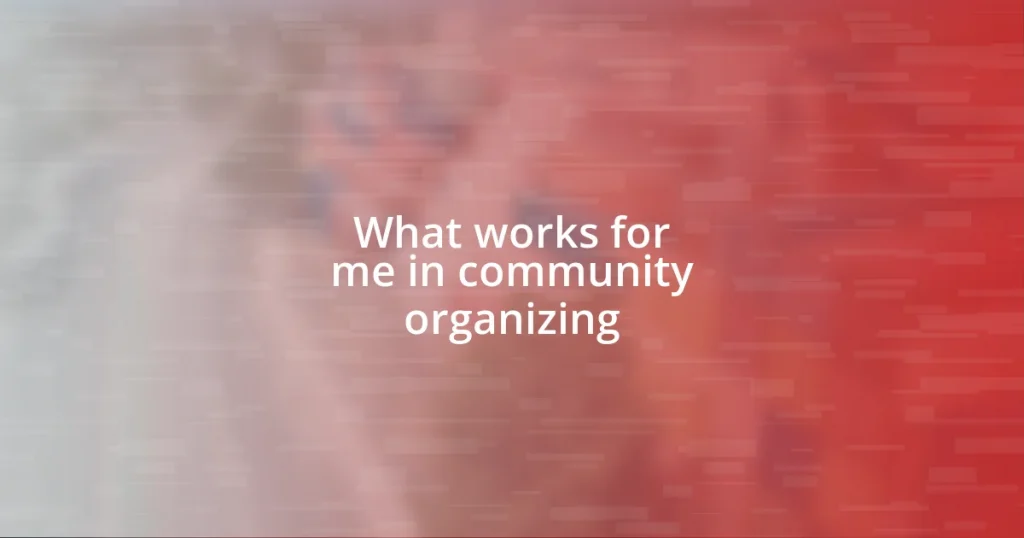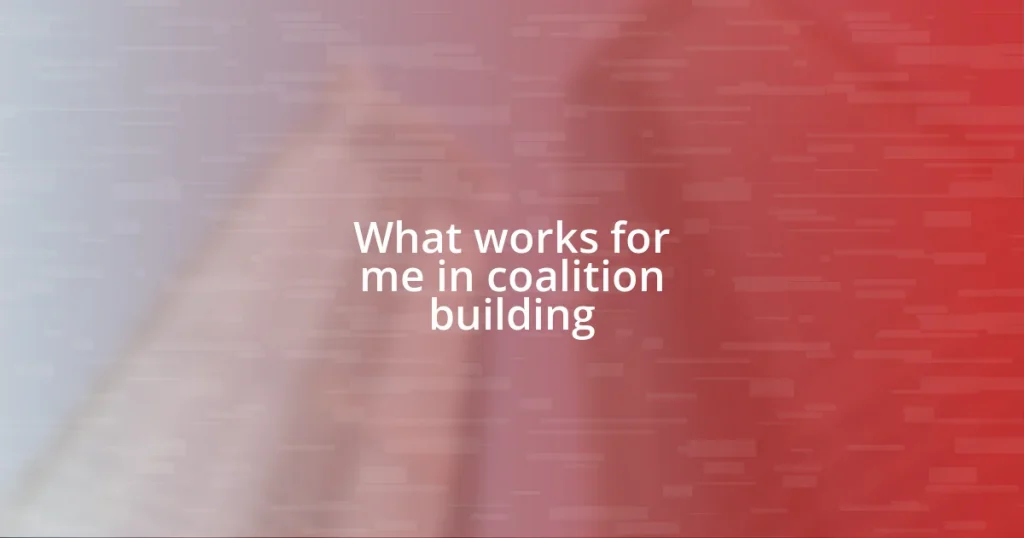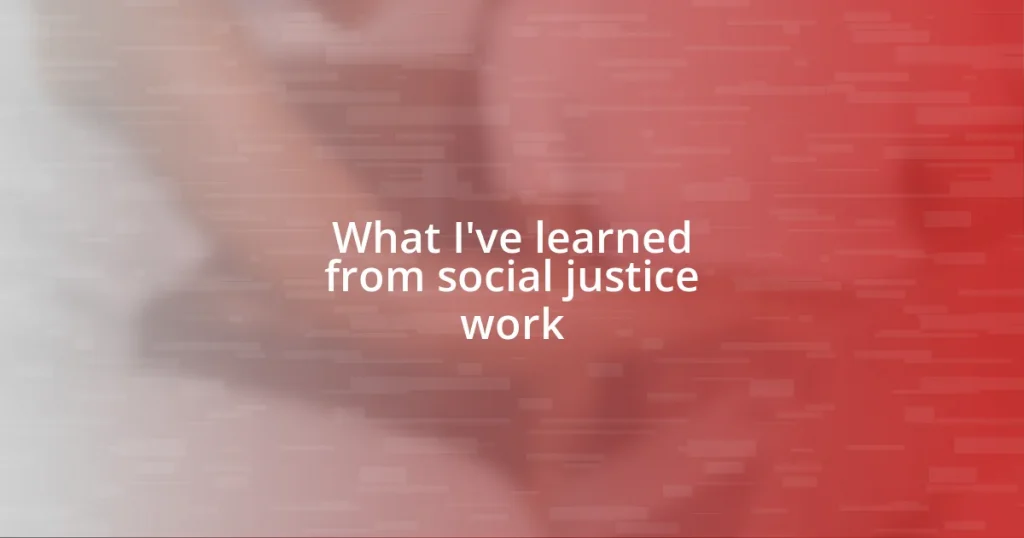Key takeaways:
- Youth-led initiatives empower young people to challenge norms and make meaningful impacts in their communities.
- Involvement in these initiatives enhances skills such as teamwork, communication, and resilience while fostering social awareness.
- Success stories highlight the transformative potential of youth leadership in driving change and creating safe spaces for dialogue.
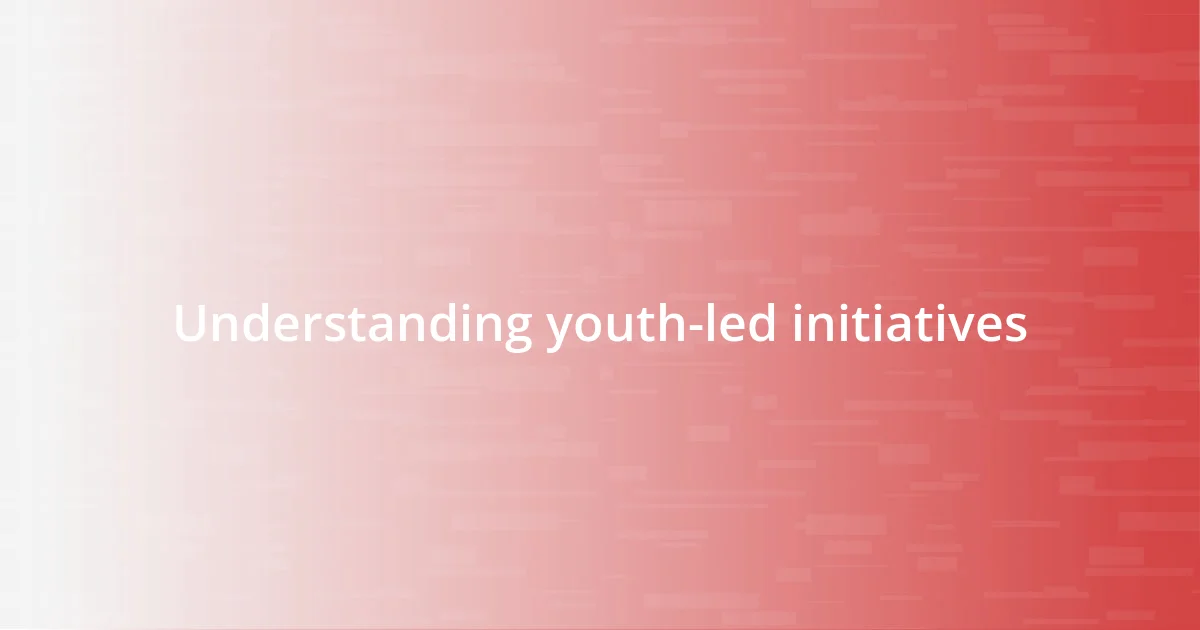
Understanding youth-led initiatives
Youth-led initiatives are often a reflection of the unique perspectives and passions that young people bring to the table. I remember participating in a local environmental project where my enthusiasm for sustainability fueled our efforts and brought the community together. It made me realize that when youth take charge, they not only implement ideas but also inspire others to think differently about pressing social issues.
What truly fascinates me is how these initiatives can break traditional power dynamics. Often, young people challenge the norms and push boundaries in ways that adults might hesitate to. Have you ever seen a group of teens organize a protest for climate action? The energy in the air is contagious and it reminded me of my own experience organizing a campaign for recycling in my school. We were young, but our voices rang loud and clear, showing that age doesn’t limit impact.
Furthermore, youth-led initiatives foster a sense of ownership and responsibility among participants. I recall the pride I felt when our project not only gained recognition but also led to real change in my community. It’s these moments that highlight the incredible potential of youth to drive innovation and change, making me wonder what other untapped ideas lie within the minds of today’s young leaders.
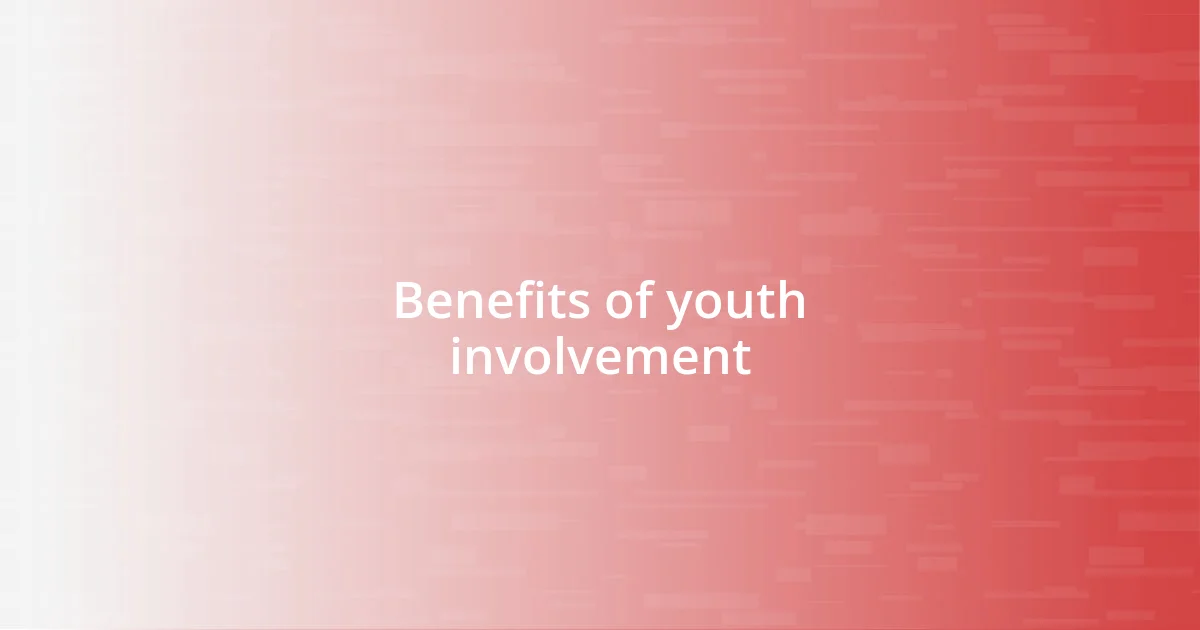
Benefits of youth involvement
In my experience, youth involvement brings vibrancy and creativity to initiatives that often lack fresh perspectives. When I took part in a youth-led arts festival, I was deeply moved by the sheer passion and innovation we displayed. Each artist’s work resonated with personal stories that connected the community, showcasing how young voices can spark conversations that matter. That experience taught me that when youth engage, they infuse projects with energy and relevance that adults sometimes overlook.
Here are some key benefits of youth involvement:
- Empowerment: Young people gain confidence and develop leadership skills, allowing them to navigate challenges proactively.
- Diverse Perspectives: Youth often bring unique viewpoints that can reshape conversations and drive more inclusive solutions.
- Community Building: Engaging youth fosters stronger community ties, creating a shared sense of purpose and belonging.
- Innovation: With their fresh ideas and approaches, young people can often find new ways of tackling old problems, leading to more creative outcomes.
- Social Awareness: Participation in initiatives helps young people understand societal issues better, building a more socially conscious generation.
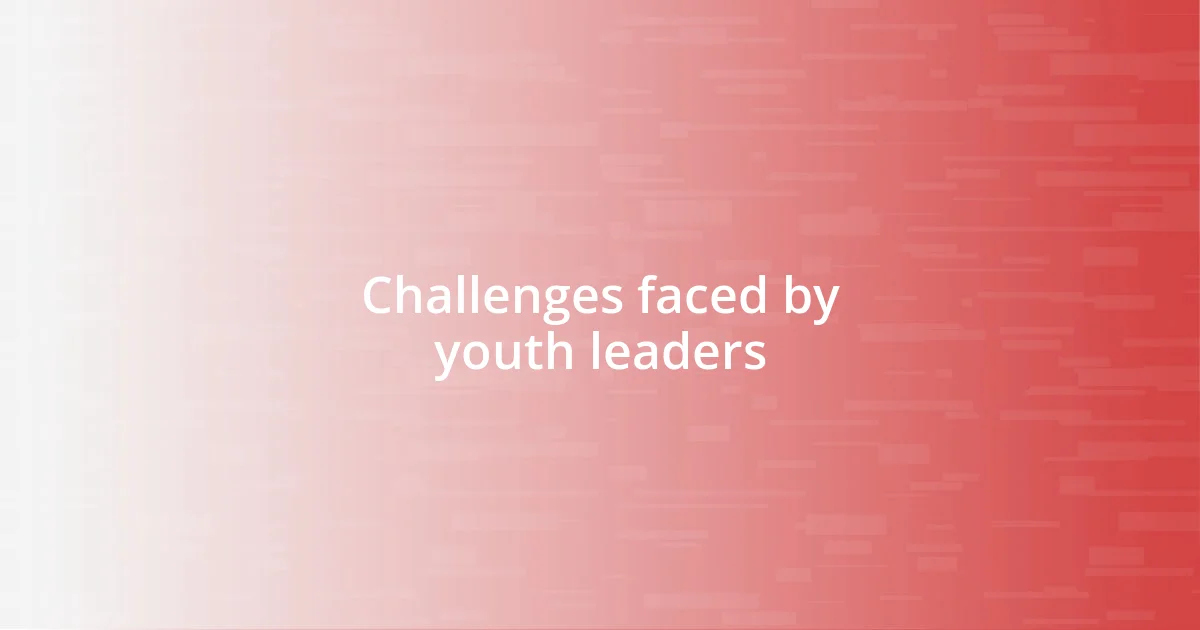
Challenges faced by youth leaders
The journey of youth leadership is often riddled with unique challenges. One significant hurdle is the lack of experience. I’ve felt this firsthand when I initiated a community service project. Doubts crept in as I navigated the planning stages, unsure if I could effectively lead. It’s daunting when you realize that adults often question your capabilities simply due to age. This can lead to feeling undervalued and frustrated, but it also fuels a desire to prove oneself.
Another challenge I faced was limited access to funding and resources. I remember pitching a project to local stakeholders and facing rejection. It stung, to be honest. Many youth-led initiatives struggle to secure financial backing, which can stifle even the most brilliant ideas. But this scarcity often pushes us to become resourceful and creative, turning constraints into opportunities. Sometimes, it’s about rallying our peers and engaging our communities to contribute in non-monetary ways, fostering deeper connections in the process.
Lastly, youth leaders often grapple with navigating the adult-dominated spaces where their initiatives may unfold. I recall attending a city council meeting, where I felt like a fish out of water. It’s challenging to voice your ideas when seasoned politicians fill the room. However, this experience highlighted the importance of perseverance and the value of establishing allies. Recognizing that while the path is fraught with obstacles, the journey can strengthen our resilience and reshape our perspectives on leadership.
| Challenges | Impacts |
|---|---|
| Lack of Experience | Can lead to doubts and feelings of inadequacy. |
| Limited Funding | Stifles creativity and the potential for project implementation. |
| Navigating Adult Spaces | Can challenge our voice and presence in decision-making forums. |
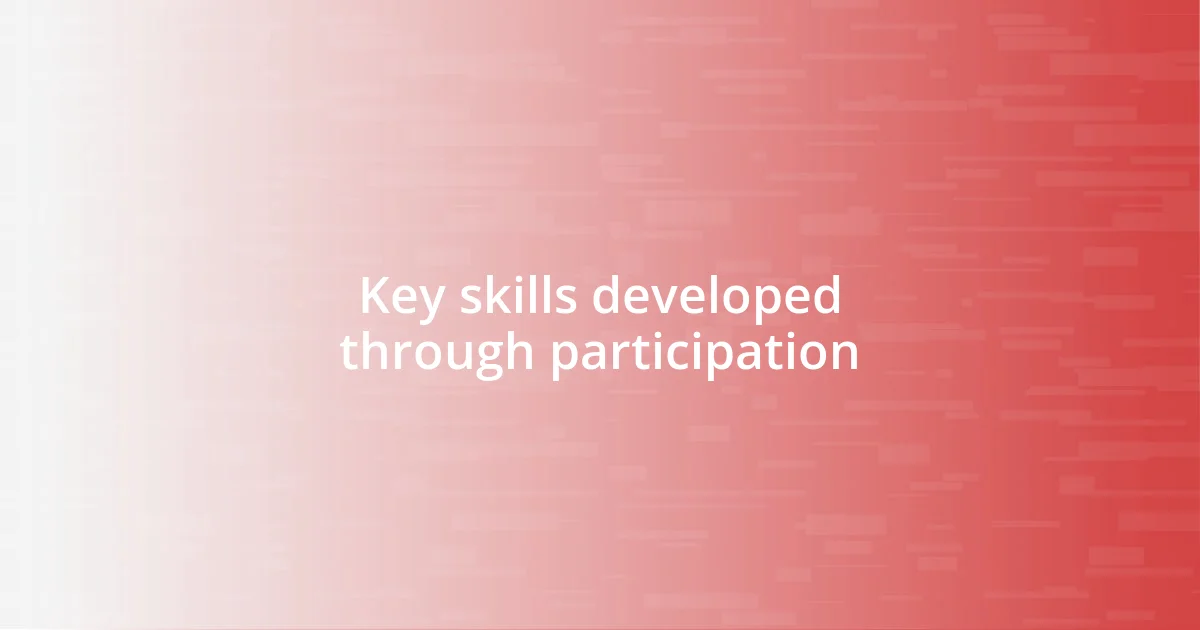
Key skills developed through participation
Participating in youth-led initiatives has helped me hone crucial skills that have shaped my personal and professional life. For instance, when I organized a community cleanup, I discovered the importance of teamwork and collaboration. It wasn’t just about cleaning up the park; it was about bringing together diverse voices and ideas, driving home the fact that together we can achieve so much more. Did you ever find yourself leading a project where the group had such different opinions? It’s enlightening to realize how shared goals can break barriers and align everyone’s efforts toward a common purpose.
Another key skill I developed through these experiences is effective communication. During a campaign to promote mental health awareness, I learned to articulate my thoughts clearly and persuasively. Crafting messages that resonate with others is no small feat, especially when addressing sensitive issues. It made me appreciate the nuances of conversation; how tone and body language matter just as much as the words we choose. Have you ever tried to convey a passionate message but felt misunderstood? I’ve certainly been there, and it emphasizes the value of refining our ability to connect.
Lastly, resilience is a skill that shines through participation. I vividly remember facing setbacks while planning a youth conference—our venue fell through last minute! Instead of giving up, I rallied my team, and we brainstormed alternatives late into the night. That challenge taught me that setbacks don’t define our journey; our response does. How do you handle unexpected challenges? I’ve learned that embracing flexibility and keeping a positive outlook can turn obstacles into stepping stones for success.
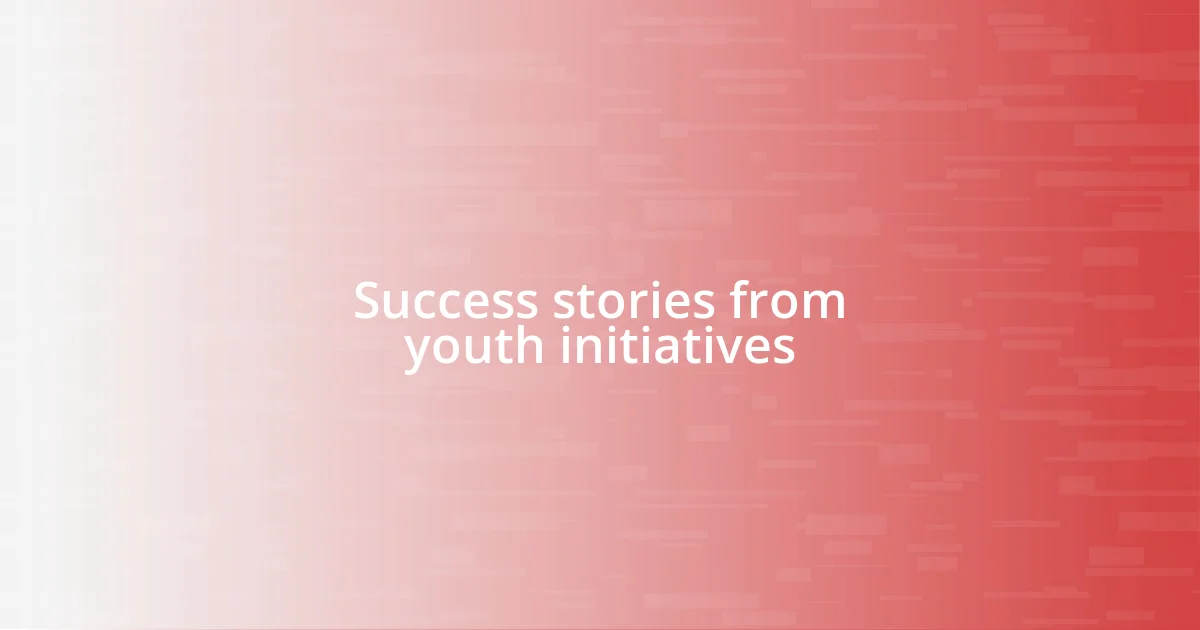
Success stories from youth initiatives
One of my favorite success stories comes from a group of friends who decided to tackle food waste in our community. They launched a local food recovery initiative, partnering with restaurants to redistribute uneaten meals to those in need. Seeing my peers passionately coordinate logistics and build relationships with local businesses was inspiring. Isn’t it amazing how a small idea can evolve into a movement that has a tangible impact on people’s lives?
Another initiative that stands out involved a youth-led environmental project aiming to revive a deteriorating creek in our town. I joined a team that organized weekly clean-up days, which not only enhanced the creek’s ecosystem but also fostered a strong community spirit. The joy of witnessing families and individuals come together, share stories, and take pride in their environment was unforgettable. How often do we underestimate the power of our local communities to drive change?
Perhaps the most touching success was a mental health awareness campaign where youths crafted personal stories and shared them in schools. I remember the tears of both students and faculty as they listened to one brave participant speak about her struggles. The initiative promoted open conversations, decreased stigma, and encouraged many to seek help. It’s moments like these that remind me how youth-led initiatives aren’t just about projects; they’re about fostering empathy and creating safe spaces for dialogue. Have you ever been part of something that shifted perspectives in such a profound way? It truly showcases the strength and potential inherent in youth leadership.

How to get involved today
Getting involved in youth-led initiatives doesn’t have to be a daunting task; it can actually be quite straightforward. You can start by seeking out local organizations and attending their meetings or events. I remember my first encounter with a youth group, feeling nervous yet excited, but once I connected with the members, I discovered a supportive environment that welcomed new ideas. Have you ever felt that spark of potential when surrounded by motivated individuals? It’s incredible how a simple step can lead you to uncharted territories of personal growth.
Another effective way to get involved is to tap into your passions and skills. Are you an artist? Consider offering your talents for a campaign’s promotional materials. I once volunteered my design skills for a youth-led awareness initiative; it was so rewarding to see my work contribute to a cause I believed in. Finding a role that aligns with your interests not only makes the experience more enjoyable but also allows you to bring your unique voice to the table. Isn’t it fulfilling to know that your expertise can make a real difference?
Finally, don’t underestimate the power of social media. Sharing information about initiatives on platforms like Instagram or Twitter can mobilize your friends and community. When I launched a small fundraising drive for a local charity, I was amazed by how quickly my network rallied together through a simple post. How often do we think about the impact our words can have in the digital space? Harnessing that potential could be the catalyst that inspires others to join the movement.

